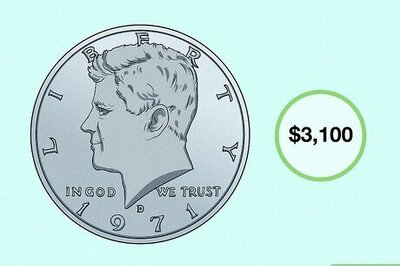
views
Berlin: When in 1948 US bombers started dropping tiny, improvised parachutes loaded with sweets into Berlin during the Soviet blockade, one little German girl wrote to complain.
Mercedes Wild, now 78, recalled how she protested that the constant drone of airlift planes disturbed her chickens -- and during the Soviet blockade of West Berlin, eggs were a valuable commodity.
Then Gail Halvorsen, the US pilot who dreamed up the candy drops, wrote back, enclosing sticks of chewing gum and a lollipop with his letter.
His gesture sparked a long-lasting friendship between Halvorsen, Wild and their families which mirrored the post-World War II German-American relationship, she told AFP.
"It wasn't the sweets that impressed me, it was the letter," she said. "I grew up fatherless, like a lot of (German) children at that time, so knowing that someone outside of Berlin was thinking of me gave me hope." "Candy bomber" Halvorsen insists that the real heroes of the Berlin Airlift -- the mammoth logistical operation to air-drop supplies into West Berlin after the Soviet Union blockaded it -- were inside the city.
"The heroes were the Germans -- the parents and children on the ground," the 98-year-old US airforce veteran said, calling them "the stalwarts of the confrontation with the Soviet Union".
The frail ex-pilot was back at Berlin's former Tempelhof airport, now a public park, for a commemoration of the daring aviation feat by western Allies in 1948-49, officially known as 'Operation Vittles'.
Tens of thousands of people on Sunday flocked to the festivities for the 70th anniversary of the end of the 15-month Soviet blockade.
"Berlin is my second home," Halvorsen, wearing his air force uniform, told a cheering crowd at the park where a vintage C-54 Skymaster plane was on display.
Looking at the blue spring sky, he said "its a beautiful day today" and added wryly that the weather "was not that good during the airlift most of the time".
The airlift was "the outstretched hand of the former war enemies to Germany," Defence Minister Ursula von der Leyen said at a ceremony on the eve of the commemoration.
It was "an act of resistance against dictatorship" and "an act of trust-building" that helped Germany's post-war democracy, she said.
Pilots flew supplies to West Berlin's 2.5 million people amid Cold War tensions in Germany's ruined capital, still reeling from the Second World War.
Operating almost non-stop and through a harsh German winter, the airlift brought in more than two million tonnes of supplies on more than 277,000 flights, mainly into Tempelhof.
At least 78 US, British and German pilots and ground crew lost their lives in accidents in the air and on the ground, as the Allies delivered fuel and food to prevent Berlin's population from starving.
It was the first major salvo of the Cold War.
Halvorsen was the first American pilot to famously drop bundles of chocolate in handkerchief parachutes to children waiting below.
To signal that he was about to release the candy-laden parachutes, Halvorsen would dip his plane's wings, earning him the nickname "Uncle Wiggly Wings".
Halvorsen rose to the rank of colonel and eventually ended up commander of the airfield.
To honour the airman, the Berlin Braves, the city's baseball team, named their ground at Tempelhof "the Gail S Halvorsen Ballpark".
The veteran flew from his home in Utah to throw the honorary opening pitch on Saturday.
After handing out candy to local children, Halvorsen urged future leaders in both Germany and America to safeguard their freedom.
"I would exhort the young people to keep an open mind to know that some leaders will lead free people in the wrong direction," Halvorsen warned.
"Freedom is important and sometimes you have to fight for it." Mercedes Wild said she still has Halvorsen's first letter to her in its original envelope.
"He became a father-figure for me," she said. "Our families have a special bond, and he's the best ambassador we could have for German-American friendship."

















Comments
0 comment